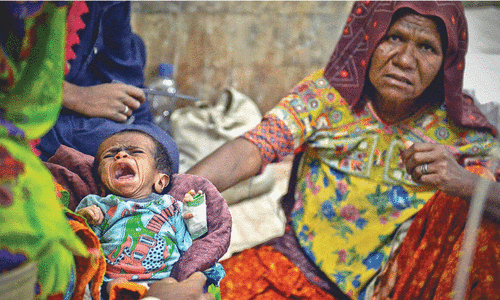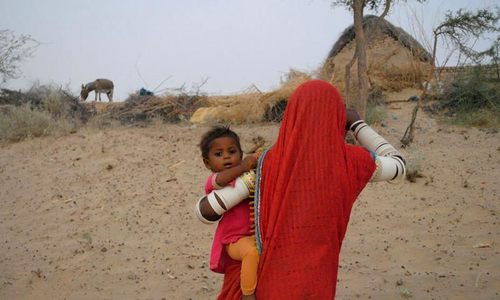KARACHI: In remarks that could be viewed as a response to former prime minister Nawaz Sharif’s recent comments about him, Chief Justice of Pakistan Justice Mian Saqib Nisar said on Saturday that he did not intend to interfere in the work of the executive but was compelled to do so due to the poor state of affairs.
Conducting suo motu proceedings on the death of children in Tharparkar, the CJP said while addressing Senator Raza Rabbani, “When we do interfere it is said that we are so foolish as to interfere in the work of the executive.”
Referring to a video clip that showed the poor state of a hospital in Larkana, he said that he felt “embarrassed” and wanted to visit the city to oversee the state of affairs there.
Apex court takes up nine cases of public interest at Karachi registry; chides health secretary for washing his hands of infant deaths in Thar
CJP Nisar was heading a three-judge bench at the Karachi registry of the apex court where he took up nine cases of public interest pertaining to promotion of doctors, inconvenience to passengers in baggage handling at airports, death of infants at the Civil Hospital in Mithi, a makeshift school on the footpath in Clifton, shifting of Sharjeel Memon from jail to hospital, provision of drinking water and better sanitation facilities, privatisation of the Pakistan International Airlines and merger of the Sindh Bank with the Summit Bank.
Children’s death case
Rejecting a Sindh government report on the matter, the SC bench directed the chief executive of the Aga Khan University Hospital to get an inquiry conducted by experts to ascertain the causes of death of infants in Mithi and Nawabshah and submit a report in one month.
As the bench took up the suo motu case pertaining to the children’s death, Sindh Health Secretary Fazalullah Pechuhu submitted a report which attributed the deaths to child marriages among other reasons and said that 50 per cent of the children had died due to pneumonia or diarrhoea.
“According to the report, it seems that you weren’t at fault at all. You have just written that underweight children die,” the CJP chided the health secretary.
PIA privatisation
The apex court’s bench that also comprised Justice Faisal Arab and Justice Sajjad Ali Shah directed the federal government, the PIA chairman and the defence ministry to file comments on an application against the privatisation of the national flag carrier in a week.
Taking suo motu action on the application, the bench also directed the respondent authorities to tell the court if the government had the intention of privatising the PIA.
The respondents were also directed to inform the court if certain profitable routes of the PIA had recently been given to other airlines, including Air Blue.
The bench restrained the authorities from making fresh recruitment in the PIA till further orders.
The apex court would hear the matter at its principal seat in Islamabad in the week beginning on April 9.
Footpath school
The apex court’s larger bench directed the Sindh government to resolve the matter pertaining to a footpath school in the Clifton area of Karachi in one week and submit a report to the court.
Syeda Anfas Ali Shah Zaidi, who has been running the footpath school near the Abdullah Shah Ghazi shrine for the past three years, had accused Sindh Education Foundation managing director Naheed Durrani of issuing threats and asking for the closure of the school in two days.
CJP Nisar said, “The children should not study on footpaths. I don’t want the children to continue to study on footpaths.”
He ordered construction of a building for the school and provision of adequate facilities to its students.
On February 17, the chief justice had forbidden action against the footpath school until alternative space was provided for its relocation.
Sharjeel’s shifting
The three-judge bench of the apex court disposed of the sou motu proceedings on the shifting of Pakistan Peoples Party leader Sharjeel Memon from jail to hospital and ruled that the high court bench hearing his bail plea might get a new medical board constituted for his medical examination.
The bench gave the ruling after an independent medical board formed on the orders of the apex court informed the judges that there were contradictions in the medical reports of Mr Memon and it could not give its opinion unless the board members themselves checked him.
Published in Dawn, April 1st, 2018














































